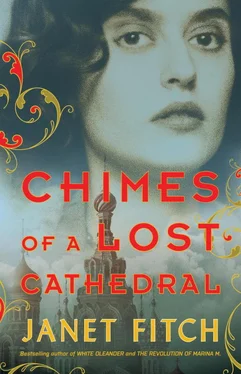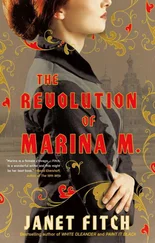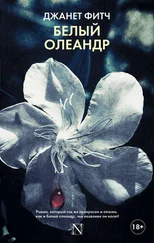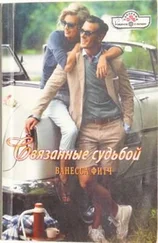Boris Osipovich Bondarin, the “Second”:Astrophysicist.
Nikolai Gerasimovich Pomogayush, the “Third”:Chemist and astrobotanist. Marusya’s mentor.
Valentin Vladimirovich Tipov, the “Fourth”:Astrophysicist.
Ludmila Vasilievna Bredikskaya, the “Fifth”:The starushka. Physicist and spectrum analyst.
Rodion Karlovich Mistropovich:Young astronomer. Returns to the observatory with his sick wife and children during the height of the Petrograd cholera epidemic, spring 1918.
The Aristocratic Communards
Princess Elizaveta Vladimirovna Gruzinskaya:The “white mouse.” Elderly aristocrat cultivated by Kolya Shurov. Foresaw collectivization of Petrograd grand apartments and preemptively formed a “collective” of her aristocratic friends, Emilia Ivanovna Golovina, Viktor Sergeevich Golovin,and Pavel Alexandrovich Naryshkin.
The Ionians
Spiritualist cult at Vera Borisovna’s family estate at Maryino—rising from the ashes of a failed experiment, the Laboratory, a large commune in Petrograd. Vera Borisovna lives in seclusion there as the “Mother,” the spiritual figurehead of the cult.
Taras Ukashin, the “Master”:Charismatic leader of the cult of Ionia. Following his teaching of inflowing, taking energy in through the skin, his followers nearly starve.
Andrei Ionian:The “intelligent.” Ukashin’s court jester. Formerly the publisher Andrei Alexandrovich Petrovin, a friend of Vera Borisovna’s and one of the founders of the spiritualist group before it was overtaken by Taras Ukashin and moved to Maryino. Commits suicide.
Other Ionians: Magda Ionian,the “gypsy”; Bogdan Ionian,former dancer at the Mariinsky Theater, Marina’s friend; Natalya Ionian,former dancer, Marina’s friend; Katrina Ionian,singer, object of Ukashin’s desire, secret lover of Pasha Ionian; Gleb,Pasha’s rival; Ilya, Lilya,and Anna Ionian.
The Maryino Villagers
Lyuda:Avdokia’s niece and Marina’s girlhood companion, whom she taught to read, married to the blacksmith and currently representing the village at the regional soviet. Protecting Ionia from the Cheka.
Olya:Avdokia’s half sister, instrumental in Marina’s escape from Ionia.
Part I
Iskra, the Spark
(March 1919–September 1919)
I WAS RISEN, risen from the dead. I had escaped the house of snow and lies, I had been spared.
An icy fog obscured the road the day I left Novinka on the back of the old man’s sledge piled with logs, heading for the market town Tikhvin. The countryside revealed itself in the foggy gaps, opening and closing like curtains. The load shifted dangerously underneath me, wooden runners jolting in the ruts. The old man smoked his pipe while I made plans that blew away like snowflakes, into the drifts and gone.
Five days we rode, stopping in villages, sleeping in straw, the child alive and moving within me. It was stubborn, like its mama. My celestial egg. Gathering strength for the jailbreak.
And out rushed oceans
Himalayas
Krakatoas,
warring nations…
Rocketing red and fiery across the dazzled brow
of Nothingness
Till Nothing itself became a memory.
At last, we descended into Tikhvin, a crossroads for centuries, with its river and its railroad, the point of arrival and departure where I’d last left my one and faithless love. His tears had run, but I had not been moved. That vain girl, walking around with her eyes shut tight, thinking that life should be straight and good, that she could pick and choose, like plucking stones out of a handful of rice. But now I was five months along with his child unborn, and had learned that imperfection was part of the weave of the world. I would return to him if I could, and pick up the stitch I had dropped.
Tikhvin was a substantial town of some twenty thousand souls—a number I once thought negligible. Now it was dizzying. So many streets, people, houses, fences, and carts… The giant Uspensky Monastery loomed with its five-towered carillon, its ancient fortress walls, which had once protected the entire population from Swedish invaders. Now Russian soldiers held the town in their grip, hanging about on street corners in their greatcoats, with their rifles and grisly bayonets. A gang of recruits marched toward a barracks, accompanied by shouts and curses. This was the current reality, the sound of the year 1919, the crash and clang of war. Time was bringing me into its brazen dance, leading me by the hand.
After days of nothing more urgent than snowbound forest and the bony rump of the horse, Tikhvin’s sprawl and energy unnerved me, and the child recoiled inside me. Like a country simpleton, I marveled at every small sight—the town seemed a metropolis, a terrifying wonder. Every sound amplified, every movement a jolt. I flinched at a carter banging crates to the ground, startled at a shout from a doorway. Now I understood the peasant’s terror when he encountered mighty Petersburg for the first time—the din of Nikolaevsky station, the bustle on Nevsky Prospect.
As the sledge scraped along toward the station, I couldn’t help but read the signs and portents. I hadn’t spent months at Ionia, trapping and hunting, without learning to read the news in sticks and hairs and tracks in snow. All the signs were bad. I saw it in the lean, blue-tinged faces of the arrivals struggling up from the station. Two sallow, soot-eyed women in black coats and too-thin shoes dragged a heavy suitcase between them, loaded no doubt with silverware and bric-a-brac to trade with the peasants for food. He who trades on the free market trades on the freedom of the people . A grim-jawed, silent group of workers following them had to be a food-requisitioning brigade. They neither spoke nor joked—they knew their assignment: to relieve peasants of their grain without recompense so they could feed their own starving brothers. I could see them pulling into themselves, hardening for the job ahead. A number of workers traveling alone walked up the main road, collars raised, a self-provisioning holiday. Their faces told me everything. No food in the city, no help, no end in sight .
Behold, the station. The old man helped me down from my throne of logs, the horse snorted its clouds into the white air. The days of hard travel had taken their toll on my body, I moved like a woman of eighty. Pine pitch and splinters stuck to my sheepskin and squirrelskin gloves. I held on to my snowshoes and game bag, unable to adjust to the assault of so many people. Travelers pushed past me as if I were a turnstile.
I gazed up at the arches. Here was where I went wrong. Here was my chance to begin again.
I shoved my way through the station and out onto the platform, where a train stood steaming, stinking, its wheels terrifyingly outsized. After the timeless introversion of the countryside, the noise scoured my ears, the child’s jerking alarm took my breath, and I clutched my snowshoes to my breast. First- and second-class passengers paced the platform, stretching their legs and doing furtive business with the peasant women selling piroshky and roasted sunflower seeds, while third-class travelers huddled in the barn doors of the boxcars, not daring to leave the train, their wooden bunks rayed behind them like shelves in a poor shop. Everyone heading east, east, east, away from Petrograd, into the snowy countryside, toward the Urals, escaping the turmoil and starvation in the capital of Once-Had-Been. My determination wavered. It slipped, shattering against the train’s iron wheels.
Читать дальше














